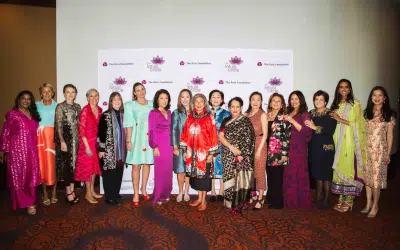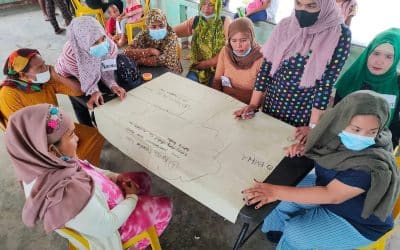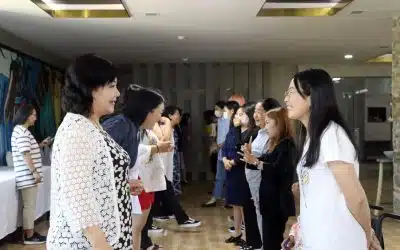InAsia
Insights and Analysis
Baseball at the Top of the World
October 11, 2023

Baseball in Thimphu, Bhutan. (Photo: Matthew DeSantis [@matthewrdesantis])
Matthew DeSantis was once a baseball-obsessed kid from New England. While working in Bhutan in 2010, in a flight of fancy, he teamed up with his colleague Karma Dorji to put on a baseball clinic in the capital city of Thimphu. Today, their fanciful idea has become the Bhutan Baseball and Softball Association.
The BBSA recently crossed paths with our own baseball-obsessed John Brandon, so we invited Matt, John, and BBSA general secretary Sanjeevan Raj Gurung to join John Rieger and Tracie Yang for a conversation.
JR: Matt, you’re the cofounder and chairman of the Bhutan Baseball and Softball Association. That’s a surprising plot twist for a guy from Connecticut. What’s your connection to Bhutan, and why baseball?
Matthew: The initial connection goes back to secondary school, where I met His Royal Highness Jigyel Ugyen Wangchuck, who is the second son of the fourth king of Bhutan.
My professional relationship with Bhutan began with computer systems. After college, I worked for the IT company Accenture. I had a lot of free time at night, and so I was helping build computer systems for various parties in Bhutan. That’s how I first decided to go to Bhutan and spend what was supposed to be just a few weeks.
But you go to Bhutan, and it’s tough to just stay three weeks. It’s a beautiful place with amazing people. Baseball was always a love since I was a child, and the entire kingdom loves sports, so it was a natural introduction.
TY: What about you, Sanjeevan?
Sanjeevan: I’ve been a part of the national cricket team of Bhutan for the last 14 years, and I got a call, “We are trying out coaches, why don’t you come train some of the baseball and softball players?” We started with five teams of boys and girls. Then we started a league.
The interesting thing about baseball and softball is that anyone and everyone can play. If you are playing basketball, you have to be a tall guy. But in baseball, it’s all about strategies.

BBSA Cofounders Mathew DeSantis and Karma Dorji. (Photo: Bhutan Baseball and Softball Assoc.)

(Photo: Bhutan Baseball and Softball Assoc.)
TY: So how did you start a baseball league in a country that had never really seen the game?
Matthew: The original concept came from me and Karma Dorji, who is the other cofounder of BBSA. At the time, Karma was working for the Bhutan Olympic Committee, and I was assisting with a project at the Committee.
We were spending a lot of time together in the office, and we had the idea to run this camp. We used social media channels to let everyone know that we were hosting the camp and providing the camp for free. The first week we had more kids arrive than we had ever really expected, and by the third week we had hundreds of kids showing up, so we couldn’t stop.

(Photo: Bhutan Baseball and Softball Assoc.)
JR: Baseball, of course, is played on large flat fields, and Bhutan is the highest country in the Himalayas. Is there a problem there at all?
Sanjeevan: Yes, the landscape itself is pretty slopy, but every school in Bhutan has a soccer field. So, currently, we are playing in a school called Motithang Higher Secondary School, which, compared to other schools, the ground is quite good to play. And we are grateful to the Motithang principal for allowing us to play, train, and conduct our league there.
Matthew: For the first number of years that we were playing, it was always on concrete slabs. And it still remains a constant challenge for us, and we do hope someday to be able to build a baseball field in Bhutan. But we’ve made long, long strides since the very beginning when everything was played on concrete.

(Photo: Bhutan Baseball and Softball Assoc.)
TY: What was the knowledge level of these kids coming in? Did they have a good idea of how baseball worked or was it totally new to them?
Matthew: Television and internet were only introduced to Bhutan in 1999 and 2000, and there’s no channel that broadcasts baseball. So, in the early days, there was no knowledge of baseball. As the game started to grow in popularity, we began to see YouTube being used as a main source for learning the game. And, Sanjeevan, I believe that’s what most of the kids do nowadays as well, is that correct?
Sanjeevan: Yes. In terms of coaching as well we have been learning everything through YouTube. To add to that, there was a cartoon character on television.
JR: A cartoon character?
Sanjeevan: Yes. It’s a Japanese anime called Doraemon. It was based on baseball. So, when we asked, “Do you guys or girls know about baseball and softball?” they would say, “Yeah, we used to watch the cartoon. So, we fell in love with the game by watching that cartoon character.”
JR: Well, one thing you can say about a cartoon character that plays baseball is that there’s going to be mighty swings of the bat and great whacks of the ball. So that’s got to make it look good.
Matthew: And in Bhutan, with the high altitude, we’re trying to do that in person, too!
JR: Oh, it’s like Coors Field in Colorado, a great place for the long ball!
Matthew: That’s right. Bhutan is the highest altitude country in the world. We’ve been fortunate to have an incredible coaching staff, and a few years back they led this effort to build a sandlot-style field. It was posted on Reddit, and we got a big response from people comparing it to Coors Field because of the altitude.

Women’s Head Coach Tshering Zangmo. (Photo: Bhutan Baseball and Softball Assoc.)
JR: Sanjeevan, you are the general secretary of the Bhutan Baseball and Softball Association. What does your work consist of?
Sanjeevan: My role is to oversee all the development of baseball and softball in Bhutan. I work as a general secretary, I work as a groundsman, I work as a coach. I work to have baseball and softball in Bhutan reach the highest level of accomplishment—getting in touch with associated federations like the World Baseball and Softball Confederation, Softball Asia, the Baseball Federation of Asia, and our national Olympic committee.

(Photo: Bhutan Baseball and Softball Assoc.)
TY: So, then, would you say that baseball’s catching on in Bhutan?
Sanjeevan: I think the journey so far has been very remarkable. More and more kids in Bhutan are taking up baseball and softball and falling in love with the sport. We were also joined in 2022 by a volunteer coach from the U.S., Mervin Moore, who has 30 years of experience coaching baseball, and his contributions have helped us immensely in terms of developing skills and game strategy.
Matthew: We’ve also had a successful year beyond the field itself. This year, we had two baseball players who, for the first time in the program’s history, received scholarships to Royal Thimphu College. And we have one player who is going to be signed by the new Middle East and Indian subcontinent professional league, Baseball United. So, come November, we’ll have the first internationally signed professional baseball player from Bhutan.

(Photo: Matthew DeSantis @matthewrdesantis)

The first recipients of college scholarships for achievements on the baseball field, awarded by Royal Thimphu College. (Photo: Matthew DeSantis @matthewrdesantis)
JR: My sons both played youth baseball here in the United States, and I really learned to love the leisurely pace of the game. What’s it like watching a baseball game in Bhutan?
Matthew: Well, Bhutan is just a very harmonious country. And the way that baseball is played in Bhutan resembles that: you feel it and you see it. There’s such joy seeing the kids laughing and playing on the field and after the games, sharing the moments together as two teams. So, I’d say that the sport, it’s reborn in a way in Bhutanese Buddhist philosophy and culture. It’s a heavenly place to play baseball.

Baseball in Thimphu, Bhutan. (Photo: Matthew DeSantis [@matthewrdesantis])
Matthew: Giving kids across the country the ability to play is an ongoing effort. We’ve been very successful in Thimphu, where we have quite a number of youth leagues and six club teams that run independently across six of the 20 districts, but it’s a very bittersweet feeling to see kids in some of the smallest villages reaching out to us on Facebook saying they want to play while we still have obstacles to providing the sport to them on a regular basis or, in many cases, at all.
The reality is that we have more kids who want to play than the league can handle, and we have more kids who want to be involved in clinics and camps, especially kids from other districts who want to come and play in these camps, which we were finally able to do through our work with The Asia Foundation.
And so, really, it’s across the board, from equipment, to field access, to expanding the reach of the game. And the final thing to mention is—and this is a very important element of what we’ve designed and what we’ve built—we offer this sport for free to all the kids.
JR: You mentioned that The Asia Foundation lent you a hand. Tell us a little bit about that.
Matthew: Years back, when no one knew that baseball was being played in Bhutan, we received an email from a man named Ramon Riesgo, who’s now the executive advisor to BBSA. He’s a big fan of baseball, from San Diego, and his first question was, well, who knows about this? How are you building relationships? So, Ramon, through his network, connected us with John Brandon, and we’ve been extremely thankful for all of The Asia Foundation’s support to date, because without that, we wouldn’t have been able to run a lot of the camps that we’ve done.
JR: So, that brings us to you, John Brandon. How did the BBSA find you?
Brandon: Well, they had noticed a blog post I had written about the influence of the United States in Japanese baseball—about Lefty O’Doul, about Babe Ruth, about Moe Berg and some others—and the people from the Association thought maybe the connection would be a good avenue to approach for support.
It reminded me of when I lived in Thailand 40 years ago: I played fast-pitch softball for the National Meteorological Association of Thailand. And I said that our Nepal office ran our modest programming in Bhutan, and that perhaps together we could make a grant that would be helpful to the Bhutan Baseball and Softball Association.
JR: Is a youth baseball league a bit of a stretch for The Asia Foundation?
Brandon: I think early in the Foundation’s history it wasn’t at all. We did such a variety of creative programming—arts and culture, all sorts of things. We might’ve done it in countries like Japan and Korea or even Taiwan, where baseball has developed a resonance over the decades. Maybe now, in the areas where we work—rule of law, civil society, environmental protection, climate resilience, women’s empowerment, international relations, regional cooperation—yeah, it may seem like a bit of a stretch, but where it’s an exact fit is our work on youth engagement in all these areas, even in ways that sometimes seem unexpected, including arts, culture, and even sports. We know that team sports can help develop healthy, well-rounded young people who will go on to be future leaders. That’s a good thing for them and their societies if you ask me. So, this is a small investment, but it can yield dividends that are far greater than the investment itself.
Sanjeevan: In the project with The Asia Foundation, we have talked about expanding baseball and softball to Paro. Paro is a district to the north of Thimphu, about 40 kilometers away. So, by the end of September or the first week of October we are planning to go to Paro. We are starting in three schools there, and we have already talked with the principals.

The Thimphu Red Pandas. (Photo: Bhutan Baseball and Softball Assoc.)
TY: So, what does the road ahead look like now? Do either of you think Bhutan could one day become a baseball power like Korea or Japan?
Sanjeevan: Yes. The journey, I think it looks bright. We are taking baby steps and focusing on the grass roots, developing fundamental skills of baseball and softball with kids. But yes, the future looks bright.
JR: Sanjeevan Raj Gurung, Matthew DeSantis, and John Brandon, thank you all for joining us.
About our blog, InAsia
InAsia is posted and distributed every other Wednesday evening, Pacific Time. If you have any questions, please send an email to [email protected].
Contact
For questions about InAsia, or for our cross-post and re-use policy, please send an email to [email protected].The Asia Foundation
465 California St., 9th Floor
San Francisco, CA 94104
The Latest Across Asia
News
April 25, 2024
Program Snapshot
April 18, 2024
News
April 17, 2024

2024 Lotus Leadership Awards
The Lotus Leadership Awards recognize contributions towards gender equality in Asia and the Pacific







0 Comments